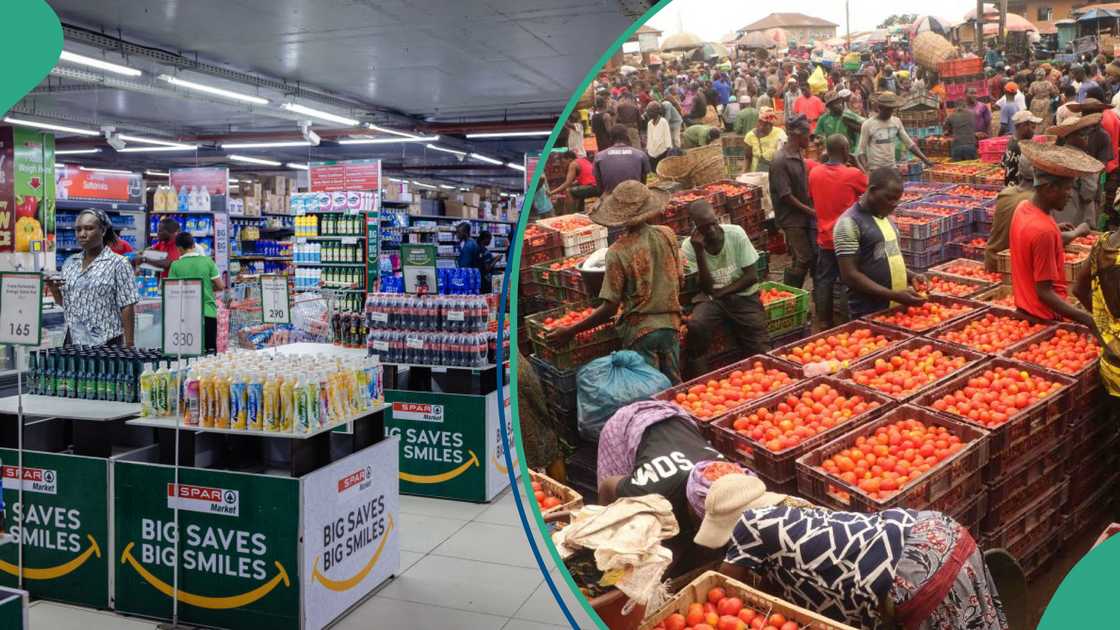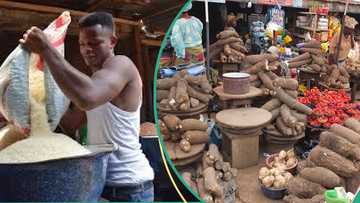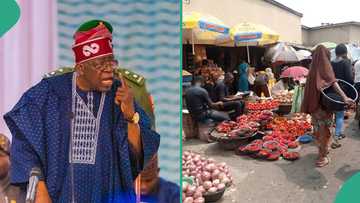Expert Sends Warning as FG Gives Traders One-Month to Crash Goods Prices
- The Federal Competition and Consumer Protection Commission has asked traders to lower their goods prices
- The commission stated that the high prices are threatening the stability of the Nigerian economy and called for a change
- CPPE CEO Muda Yusuf, in a message to Legit.ng, warned of the dangers of the directive and demanded the promotion of competition
Legit.ng journalist Dave Ibemere has over a decade of business journalism experience with in-depth knowledge of the Nigerian economy, stocks, and general market trends.
The Centre for the Promotion of Private Enterprise (CPPE) has advised the Federal Competition and Consumer Protection Commission (FCCPC) to avoid controlling the prices of goods.

Source: Getty Images
Legit.ng earlier reported that CCPC gave businesses a one-month ultimatum to reduce prices.
Tunji Bello, Executive Vice-Chairman and CEO of FCCPC, suggested that businesses engaged in price fixing and gouging will face penalties, as these practices are deemed unfair and detrimental to consumers.
PAY ATTENTION: Сheck out news that is picked exactly for YOU ➡️ find the “Recommended for you” block on the home page and enjoy!
CPPE sends warning to FCCPC
In reaction, Muda Yusuf, CEO of CPPE, criticised the FCCPC’s directive, suggesting the commission is transforming from a consumer protection agency into a price control agency.
He noted that consumer protection should not be involved in direct price controls at the retail level but rather promote a competitive market environment.
His words:
“The disproportionate focus of the commission on the retail segment of the economy and pricing issues underscores this assertion. The core mandate of the commission is the creation of a robust competition framework across sectors and protection of consumer rights and interests.
“Consumer protection is not about directly seeking to control price at the retail end of the supply chain.

Read also
"Substantial fines and imprisonment": FG gives traders one-month deadline to crash food prices
"This is why the CPPE is concerned about the approach, methodology, targeting and the recent threats by the FCCPC to market leaders, traders and supermarket owners.
“The commission seem to be fighting the symptoms rather than dealing with the causes of the current inflationary pressure in the economy. Even then, the core mandate of the commission is not to fight inflation. The fiscal and monetary authorities are statutorily responsible for macroeconomic policy issues and are better placed to deal with the challenge of high prices.”
Yusuf contended that the retail sector's high player count makes it less susceptible to sustained price gouging.
He noted that retailers typically lack the power to influence prices significantly due to the perishable nature of many goods they handle.
“The truth is that the retail segment of the economy is the least vulnerable to price gouging or consumer exploitation on a sustainable basis, contrary to the thinking of the commission.
"When consumers have choices, it is difficult to exploit them.
“The retail sector of the economy is characterized by a multitude of players. There are an estimated eight million retailers in the trade sector of the Nigerian economy. And there are thousands of supermarkets, departmental stores and markets across the country.
“The higher the number of players in a sector the more competitive the operating environment becomes and the more difficult it becomes for profiteering to take place.”
What is driving food prices
On the price issues, Yusuf said that the driving factors include exchange rate depreciation, high energy costs, and logistical challenges.
He also highlighted the issue of Nigerian products being exported at higher prices due to a weaker naira compared to neighbouring currencies, which has increased domestic price pressures.
Yusuf advised the commission to stop intimidating retailers, warning that there is an emerging risk of market suppression and private enterprise repression by the FCCPC if the current trajectory continues.
“The commission needs to be more diligent and thorough in its analysis before alleging consumer exploitation by the trading community. Sample size needs to be significant and data integrity needs to be assured to make the commission’s verdicts credible.
“The example of the comparative price of a particular brand of fruit blender in the USA and Nigeria cited by the commission is too simplistic and superficial to be relied upon as a basis for the commission’s generalization about consumer exploitation by supermarkets in the country.
FCCPC condemns increase in pure water price
In related news, Legit.ng reported that the FCCPC had condemned the increase in the price of sachet water, better known as pure water, across the country.
Adamu Abdullahi, the commission's chief, stated this while speaking in Abuja at an event commemorating the 2024 World Consumer Rights Day.
The price of sachet water increased to sell for N300-N500 a bag, depending on the location, from N200, which it initially sold.
The Association of Table Water Producers (ATWAP) in Enugu said members at an emergency meeting agreed to hike the price.
PAY ATTENTION: Donate to Legit Charity on Patreon. Your support matters!
Source: Legit.ng





